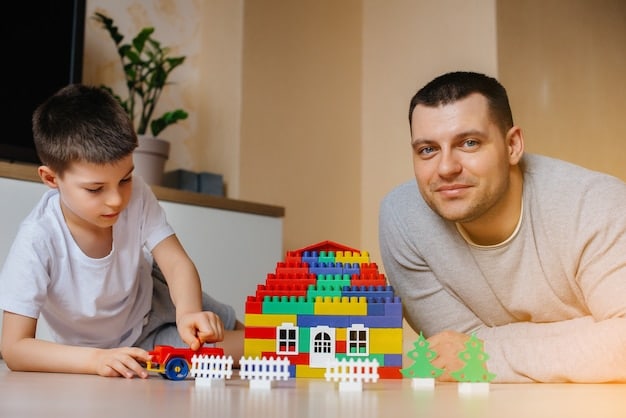Single Father’s Guide: 5 Proven Strategies for Stronger Bonds in 2025

Single fathers seeking to strengthen their relationships with their children in 2025 can focus on five core strategies: prioritizing quality time, fostering open communication, promoting emotional intelligence, establishing consistent routines, and embracing personal growth while modeling resilience for their families.
Navigating fatherhood, especially as a solo parent, presents unique challenges and unparalleled rewards. In 2025, with changing societal dynamics and technological advancements, building deep, meaningful connections with your children is more crucial than ever. This Single Father’s Guide: 5 Proven Strategies to Build Stronger Bonds with Your Children in 2025 offers actionable advice and insights for single fathers dedicated to fostering resilient, loving family units.
The Evolving Landscape of Single Fatherhood
Single fatherhood in 2025 comes with new responsibilities and exciting opportunities. Traditional family structures have broadened, and the role of a father has become increasingly central in the emotional and developmental well-being of children. It is not just about providing; it’s about nurturing, guiding, and emotionally supporting. The demands on time and resources for a single dad can be immense, requiring deliberate effort to carve out spaces for connection that truly matter.
Modern single fathers often juggle careers, household management, and their children’s myriad activities. This balancing act can lead to feelings of overwhelm, making it difficult to prioritize intentional bonding. However, understanding that even small, consistent efforts yield significant dividends is key. The emphasis shifts from merely being present to being fully engaged and attuned to the children’s needs and expressions.
Furthermore, societal expectations continue to evolve. Single fathers are increasingly recognized for their vital roles beyond just being a secondary caregiver. They are primary attachment figures, emotional anchors, and role models in every sense of the word. Acknowledging this comprehensive role is the first step toward embracing strategies that transcend superficial interactions and build genuinely strong bonds.
Understanding the Unique Challenges
Single fathers often face specific challenges that can impact their ability to connect deeply with their children. These can range from logistical hurdles to emotional pressures.
- Time Constraints: Balancing work, errands, and childcare leaves little free time.
- Financial Pressure: Single-income households may add stress, affecting recreational opportunities.
- Emotional Burden: Fathers might feel the need to be “strong” and suppress their own emotional needs.
- Lack of Support System: A limited network can exacerbate feelings of isolation and stress.
Addressing these challenges requires a pragmatic and often creative approach. It might involve seeking out community resources, building a strong support network of friends and family, or even rethinking traditional roles within the household to streamline daily tasks. The goal is to free up mental and physical space, allowing for more authentic engagement with children.
Moreover, the emotional landscape for children in single-parent households can be complex. They may be dealing with the absence of another parent, adjustment to new routines, or a desire for increased attention. A father’s empathetic understanding and proactive approach to these emotional nuances are fundamental to fostering security and trust.
Strategy 1: Master the Art of Quality Time
In a world brimming with distractions, true quality time is a rare commodity. For single fathers, it’s not about the quantity of hours spent together, but the depth and focus of those moments. In 2025, this means being fully present, putting away devices, and actively engaging in shared experiences that create lasting memories.
Quality time doesn’t always have to involve grand outings or elaborate plans. It can be found in the everyday moments: a shared meal, a car ride to school, or reading a bedtime story. The key is to make these moments intentional and free from external interruptions. When a child feels they have their father’s undivided attention, it reinforces their sense of value and importance within the family unit.
Deepening Everyday Interactions
Transforming mundane activities into bonding opportunities requires a shift in mindset. It’s about being mindful and seizing opportunities for connection.
- Mealtime Connection: Dedicate dinner to conversation, going around the table to share “highs and lows” of the day.
- Bedtime Rituals: Reading a book, telling stories, or simply talking about their day creates a consistent moment of intimacy.
- Shared Hobbies: Discover an activity you both love, whether it’s building models, playing sports, or cooking, and make it a regular fixture.
Even small pockets of time can be incredibly impactful. A five-minute conversation after school, a quick game of catch in the yard, or listening to their favorite song together in the car can cumulatively build a strong emotional bank account. These moments signal to your child that they are a priority and that you genuinely enjoy their company.
Moreover, active listening is a critical component of quality time. It means not just hearing the words but understanding the emotions and unspoken messages behind them. When children feel truly heard, they are more likely to open up and share their inner worlds, deepening the bond.
Remember, your presence is your present. Focusing on your child when you are with them, even if it’s for a short while, communicates love and respect more effectively than any elaborate gift or planned event. It’s the consistent, heartfelt effort that weaves the fabric of strong relationships.

Strategy 2: Cultivate Open and Honest Communication
Effective communication is the bedrock of any strong relationship, and for single fathers, it’s paramount. Creating an environment where children feel safe to express their thoughts, feelings, and concerns without judgment is essential. This strategy goes beyond simply talking; it emphasizes active listening, validation, and fostering a dialogue that builds trust.
In 2025, with digital communication permeating every aspect of life, teaching children the nuances of open, in-person conversation is vital. It’s about teaching them to articulate needs, process emotions, and understand different perspectives. As a single father, you are their primary model for healthy communication.
Fostering a Safe Space for Expression
Children need to know their voices are valued. Establishing a “safe space” means ensuring they feel comfortable sharing anything, big or small.
- Active Listening: Give your full attention when your child speaks, making eye contact and avoiding interruptions.
- Validate Feelings: Acknowledge their emotions, even if you don’t agree with their perspective. Phrases like “I hear that you’re feeling frustrated” can be powerful.
- Encourage Questions: Let them know no question is silly and that you’re always there to provide guidance or answers, however difficult.
Honesty, even when it’s tough, is crucial. If you’re going through a challenging time, communicate it in an age-appropriate manner. Children are perceptive; they often sense when something is wrong. Openness, within limits, can alleviate anxiety and prevent them from imagining worse scenarios.
Regular check-ins are also important. These don’t have to be formal meetings. They can be spontaneous conversations during a car ride, while doing chores together, or simply before bedtime. The goal is to make communication a continuous, natural part of your family dynamic, not just a response to a problem.
Remember that communication is a two-way street. Share aspects of your own day and feelings (appropriately) to model vulnerability and openness. Seeing their father express emotions in a healthy way teaches children that it’s okay for them to do the same.
Strategy 3: Promote Emotional Intelligence and Resilience
One of the greatest gifts a single father can give his children is the ability to understand and manage their emotions, alongside developing resilience in the face of life’s inevitable challenges. Building strong bonds requires a father who not only responds to emotional outbursts but also proactively teaches emotional literacy.
In a rapidly changing world, emotional intelligence is a critical skill for success and well-being. By 2025, fostering this in children involves guiding them through emotional landscapes, teaching coping mechanisms, and modeling healthy ways to navigate stress and disappointment.
Teaching Emotional Regulation and Empathy
Helping children identify and articulate their feelings is the first step toward emotional mastery. This involves moving beyond simple labels like “happy” or “sad.”
- Name Emotions: Help children identify specific feelings (e.g., frustration, excitement, anxiety) and why they might be feeling them.
- Problem-Solving Focus: Instead of immediately stepping in to fix an issue, guide them to brainstorm solutions for their problems.
- Practice Empathy: Encourage them to consider others’ feelings. Ask, “How do you think your friend felt when that happened?”
Resilience isn’t just about bouncing back; it’s about learning and growing from adversity. Single fathers inherently model resilience through their daily efforts. However, discussing these moments explicitly can make the lesson clearer for children. Talk about your own challenges and how you’ve overcome them, not to burden them, but to show them that struggles are a normal part of life.
Allow children to experience disappointment and minor failures, offering comfort and support rather than immediate rescue. This teaches them that it’s okay to make mistakes and that they have the inner strength to recover. This builds a robust emotional foundation, empowering them to face future challenges with confidence.
Creating a culture where emotions are discussed openly and handled constructively reinforces the bond between father and child. It tells children that their internal world is important and that their father is a safe harbor for all feelings.
Strategy 4: Establish Consistent Routines and Clear Boundaries
Predictability and structure provide a sense of security and stability for children, especially in single-parent households that might experience more transitions. Consistent routines help children know what to expect, reducing anxiety and creating a framework within which they can thrive. Clear boundaries, on the other hand, teach responsibility, respect, and self-control, all essential for strong relationships.
In 2025, with increasingly busy schedules, establishing and maintaining routines can be challenging but incredibly beneficial. It simplifies daily life, reduces power struggles, and frees up mental energy for meaningful interactions. Boundaries ensure mutual respect and healthy family dynamics.
The Power of Predictability and Structure
Children flourish when they have a sense of order. Routines provide this comfort and help them develop independence.
- Daily Schedule: Implement consistent times for waking up, meals, homework, playtime, and bedtime.
- Household Chores: Assign age-appropriate responsibilities to foster a sense of contribution and teamwork.
- Weekend Planning: While flexible, having a general plan for weekends can minimize uncertainty and maximize enjoyment.
Consistent routines are not just about discipline; they create dedicated spaces for bonding. For instance, a regular family movie night or a weekly game can become cherished traditions. These routines act as anchors in a child’s life, especially when external circumstances might be tumultuous.
Boundaries are equally important. They communicate expectations and limits, which are vital for a child’s social and emotional development. When boundaries are clear, fair, and consistently enforced, children learn self-discipline and respect for rules and others.
It’s crucial to involve children in the discussion of routines and boundaries where appropriate. This gives them a sense of ownership and makes them more likely to adhere to the established framework. Explain the “why” behind rules, focusing on safety, respect, and well-being, rather than just imposing them.
A structured environment, guided by firm yet loving boundaries, provides the secure foundation upon which a strong and loving father-child relationship can be built. It reflects a father’s care and commitment to their overall well-being.

Strategy 5: Embrace Personal Growth and Model Resilience
As a single father, your personal journey of growth and resilience is a powerful lesson for your children. They watch how you navigate challenges, how you manage stress, and how you learn and adapt. Embracing your own growth—be it emotional, professional, or personal—not only makes you a better parent but also provides an invaluable blueprint for your children’s own development.
In 2025, the concept of lifelong learning and self-improvement is more pertinent than ever. For single fathers, this means carving out time for self-care, pursuing personal interests, and continually working on becoming the best version of themselves. This modeling of continuous improvement directly impacts the strength and quality of your relationship with your children.
Prioritizing Self-Care and Continuous Learning
You cannot pour from an empty cup. Taking care of your own physical, mental, and emotional health is not selfish; it’s essential for effective parenting.
- Schedule Downtime: Ensure you have regular time for hobbies, exercise, or simply relaxing alone.
- Seek Support: Connect with other single fathers, friends, or family members who can offer empathy and advice.
- Learn & Grow: Read books, take courses, or pursue new skills. Show your children the joy of continuous learning.
Modeling resilience means letting your children see you stumble sometimes, but more importantly, letting them see you get back up. Talk about your failures and what you learned from them. This vulnerability builds connection and teaches children that imperfection is a part of being human.
When you prioritize your own well-being, you demonstrate to your children the importance of self-respect and self-worth. They learn that adult responsibilities don’t mean sacrificing one’s identity or happiness. This healthy balance can inspire them to pursue their own passions and take care of themselves as they grow.
Ultimately, a father who is committed to his own growth and well-being is better equipped to guide and support his children. Your internal strength becomes a source of stability and inspiration for your family, creating a deeper, more profound bond built on mutual respect and shared journey of life.
| Key Strategy | Brief Description |
|---|---|
| ⏰ Quality Time | Focus on undivided attention and shared experiences, making everyday moments count. |
| 💬 Open Communication | Create a safe space for expression, practice active listening, and encourage honesty. |
| ❤️ Emotional Intelligence | Teach children to recognize emotions, cope with challenges, and build resilience. |
| ✅ Consistent Routines | Establish predictable schedules and clear boundaries for security and healthy development. |
Frequently Asked Questions for Single Fathers
Balancing work and quality time involves intentional planning. Look for small, consistent moments: meal prep together, carpooling discussions, or a daily bedtime story. Prioritize being fully present during these times by minimizing distractions. Delegate non-essential tasks if possible, and don’t be afraid to ask for help from your support network.
If your child resists, it’s often a sign of underlying emotions or a need for a different approach. Try indirect bonding activities like shared projects or games where conversation flows naturally without pressure. Ensure you create a judgment-free zone and consistently show patience. Sometimes, just being physically present and available when they’re ready to talk is enough.
Addressing emotional challenges requires you to step into a dual role thoughtfully. Seek support from trusted friends, family, or professional counselors to discuss your feelings. For your child, validate their emotions, help them name what they’re feeling, and provide clear, reassuring communication. Consider age-appropriate books or resources to help them process complex emotions.
Effective boundary setting involves clarity, consistency, and communication. Explain the “why” behind rules, focusing on safety and mutual respect, rather than just dictating. Involve older children in creating some household rules to foster buy-in. Consistently enforce consequences calmly and fairly, ensuring both parents (if applicable) present a united front on expectations.
Self-care is critically important for single fathers; it prevents burnout and models healthy habits for your children. Integrate it by scheduling small, regular blocks of time for yourself, whether it’s for exercise, a hobby, or quiet reflection. Don’t view it as a luxury, but as essential for maintaining your physical and mental well-being, making you a more effective and present parent.
Conclusion
Building meaningful connections as a single father is a path defined by resilience, intentional love, and unwavering presence. While the journey comes with unique emotional and practical challenges, guidance from dedicated resources — como os conselhos direcionados para pais solo disponíveis em plataformas de apoio como esta reflexão sobre single dad advice — mostra que pequenas mudanças consistentes podem transformar profundamente a dinâmica familiar.
By prioritizing quality time, nurturing emotional intelligence, establishing steady routines, and investing in personal growth, single fathers create a space where their children feel safe, seen, and deeply loved. These five strategies go beyond parenting techniques — they become a foundation for lasting connection, shaping a home where strength and affection walk hand in hand, and where fatherhood becomes not just a responsibility but a legacy of love.





